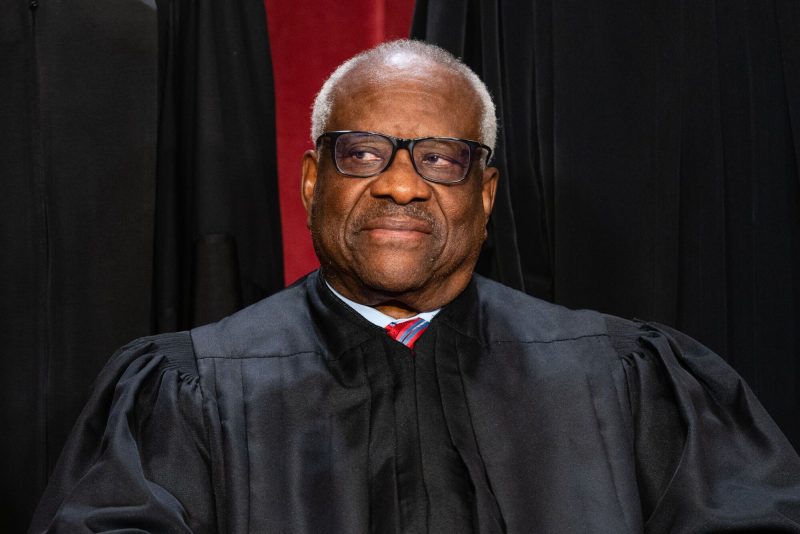Allegations from congressional Democrats that Justice Clarence Thomas probably violated federal ethics laws in his dealings with a Republican donor have been sent to a committee of federal judges responsible for “addressing allegations of errors or omissions in the filing of financial disclosure reports,” a top judicial official said Tuesday.
Sen. Sheldon Whitehouse (D-R.I.) and Rep. Hank Johnson (D-Ga.) had requested that the Judicial Conference of the United States investigate Thomas’s failure to disclose travel and real estate deals with his longtime friend and benefactor, Dallas business executive Harlan Crow. Whitehouse and Johnson said the conference should refer the matter to Attorney General Merrick Garland.
“There is reasonable cause to believe that Justice Thomas willfully failed to file information required to be reported under the Ethics in Government Act of 1978,” the Democrats wrote.
U.S. District Judge Roslynn R. Mauskopf, director of the Administrative Office of the U.S. Courts, responded Tuesday to say the lawmakers’ complaint had been referred to the authorized committee.
“I have forwarded your letter to the Judicial Conference Committee on Financial Disclosure, which is responsible for implementing the disclosure provisions of the Ethics in Government Act and addressing allegations of errors or omissions in the filing of financial disclosure reports,” Mauskopf wrote in a letter obtained by The Washington Post.
Her short reply did not indicate how or whether the committee would proceed.
The Judicial Conference is chaired by Chief Justice John G. Roberts Jr. Sixteen federal judges sit on the Committee on Financial Disclosure. U.S. District Judge David L. Bunning, the committee’s chairman, did not immediately respond to a request for comment Tuesday about how the panel would handle the referral.
Thomas’s disclosure history is in the spotlight after ProPublica revealed this month that Crow took him on lavish vacations that included private jet travel and annual retreats to the Adirondacks. Later, the nonprofit investigative news organization reported that Crow had bought three properties in Savannah, Ga., from Thomas and his relatives for about $133,000, including the house where the justice’s mother lives.
The justice did not disclose the transaction on his annual financial report, which requires disclosure of any sale or purchase of property over $1,000. He also did not report the travel and trips with Crow.
Thomas said in a statement that colleagues — who he did not name — advised him years ago that he did not have to report the vacations because they were “personal hospitality” and that he has always tried to comply with disclosure guidelines. He has not publicly addressed the property transaction.
Crow befriended the justice 27 years ago, a few years after Thomas joined the Supreme Court. In an interview this week with the Dallas Morning News, Crow said he approached Thomas about buying his mother’s home “with the idea that … in due course it could be the boyhood home of a great American.”
Whitehouse and Johnson did not return a request for comment on Tuesday.
Kedric Payne, senior director of ethics at the Campaign Legal Center, which had also lodged a complaint against Thomas about the lack of disclosures, said it was significant that the conference acknowledged the letter from the lawmakers and referred it to a committee.
“This is definitely the first step,” Payne said. “It’s encouraging if they work quickly.” His organization has not yet received a response from the conference.
The judiciary’s financial disclosure rules outline a disciplinary process for not filing the required information. The judicial conference can refer individuals to the U.S. attorney general, who can in turn file a civil action or initiate a criminal prosecution for “knowingly and willfully falsifying or failing to report any financial disclosure information.”
Legal ethics experts could not recall any judge or justice sanctioned in a case brought by the attorney general. In 2014, the Justice Department investigated the travel expenses of a federal appeals court judge and declined to prosecute him.
Thomas has amended his financial disclosure reports in the past in response to reports that they were incomplete.
In 2011, after the watchdog group Common Cause raised red flags, Thomas updated years of his financial disclosure reports to include employment details for his wife, conservative activist Virginia “Ginni” Thomas. The justice said at the time that he had not understood the filing instructions.
Ginni Thomas earned more than $686,000 from the conservative Heritage Foundation from 2003 until 2007, according to the nonprofit’s tax forms. Clarence Thomas checked a box labeled “none” for his wife’s income during that period. He had done the same in 2008 and 2009 when she worked for conservative Hillsdale College.
In 2020, he again revised his disclosure forms after a different watchdog group found that he did not report reimbursements for trips to speak at two law schools.
The Post reported on Saturday that over the last two decades, Thomas has reported that his family received rental income totaling hundreds of thousands of dollars from a firm called Ginger, Ltd., Partnership.
But that company — a Nebraska real estate firm launched in the 1980s by his wife and her relatives — has not existed since 2006. That year, the family real estate company was shut down and a separate firm was created, state incorporation records show. The similarly named firm, Ginger Holdings, LLC, assumed control of the shuttered company’s land leasing business, according to property records.
Since that time, however, Thomas has continued to report income from the defunct company — between $50,000 and $100,000 annually in recent years — and there is no mention of the newer firm.
The latest revelations about the justice have split the political world, with some Democratic elected officials, including Johnson, calling for his resignation. Some Republican politicians have said the reporting about Thomas is an attempt to discredit his influence on the increasingly conservative Supreme Court.
Senate Minority Leader Mitch McConnell (R-Ky.) said Tuesday that the matter should be handled by the judiciary: “I have total confidence in the chief justice of the United States to deal with these court internal issues.”
Shawn Boburg and Emma Brown contributed to this report.



























